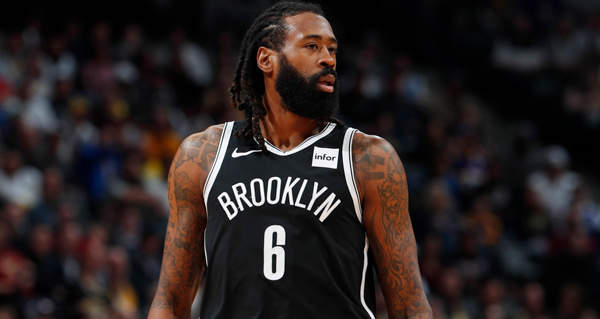This is how it ends. You get bought out and there are only a couple options left, a contender or two willing to take a flier on you, unclear on whether you’re going to be their 10th man or the 14th, not overly concerned with how it shakes out because it’s not like they’re investing much—money or hope. Worst-case scenario, you’re a veteran presence. No one outside the locker room will know what this means, if you’re genuinely helpful in hard to define ways or just a guy who can’t play anymore. You are hanging around, until you’re not invited to hang around anymore.
DeAndre Jordan’s career was already winding down two summers ago, when the Brooklyn Nets signed him less as a starting five than as a security blanket for Kyrie Irving and Kevin Durant. They wanted their buddy on the team—at a pretty steep price—and the Nets weren’t going to deny them anything. Everyone recognized the problem immediately: isn’t DeAndre Jordan past it? Hasn’t the league passed players like DeAndre Jordan by? There’s never been a worse time to be a big fella with range that barely extends past the rim, and DeAndre in his 30s is not the same powerful athlete who was catching lobs from Chris Paul in the early 2010s. Well whatever, you do what you have to in order to keep Durant and Kyrie satisfied, for them to take their sweet time realizing oh right, our friend is not a very useful player anymore. Jordan’s going to be on the market soon, because Blake Griffin can play the five in 2021 and Day’Ron Sharpe is 6-foot-11 and 19 years old. He’ll put in whatever work you ask him to. Jordan was verging on expendable the minute he showed up in Brooklyn. Now he’s simply in the way. The Nets need the roster spot.
The Lakers, already betting on a half-dozen potentially washed up vets, hoping that half of them are still serviceable, are reportedly sniffing around. Does DeAndre offer more than Dwight Howard? This is supposed to be a somewhat interesting question because it pertains to what a squad with title ambitions might get out of their backup center spot, and championships are often decided at the margins, but in late August, with the summer heat lingering like a bad party guest and a Western Conference Finals the Lakers might not even qualify for so far off in the future, it’s hard to care. DeAndre Jordan is much more well-liked by his peers than Dwight Howard, there is that. He certainly adds value as a team charter card player. Put that in the signing’s report card, if it comes to pass.
Let’s say the Lakers move doesn’t happen. There’s a possibility that there’s no place else for Jordan to go, or at least nowhere that he would want to go. (Does the tail end of Oklahoma City’s rotation appeal to you, DeAndre? No? Well, we thought we’d ask.) It’s possible he’s reached the point in a player’s career when you find out how much they like playing and practicing, being around a basketball team, cashing a paycheck dwarfed by what they pulled down when they were 25. It’s true that some athletes don’t have any choice when their time is up, but it’s often not a binary thing, more like a winnowing of choices. You can do this less than ideal thing, this unpalatable thing, or you can retire. There are no wrong answers, but to the player it may seem like there aren’t any right ones either. You wish you could create a better set of options, be 27 again, with your teammates happily holding you hostage and an opposing team owner literally driving around your neighborhood during free agency, trying to text you and your agent. Or maybe this is a fine time to get out. Who knows how strong DeAndre Jordan’s desire to play is, the strength of his outside interests.
The end, of course, is more metaphorical than anything. Age 33 is far too young to spend the rest of your life killing time. Guys like DeAndre Jordan need to find something to do. But the end of an NBA career is the end of a heightened existence that might someday seem like a dream. At his peak Jordan was pretty famous, the charismatic third dude on some really good Clippers squads. But fame runs out rather quickly for ex-jocks who were never superstars. Steph Curry’s going to be famous forever. The vast majority of people will not know or remember who DeAndre Jordan is, a couple decades from now. That bothers you, or it doesn’t. Many currently famous people wish they were anonymous. But there is something to being noticed and considered and praised and critiqued, to feeling like you matter, even in the minor way somebody getting eight minutes per night on a playoff team does. It’s a feeling that Jordan is unlikely to achieve once he walks away from the NBA. Surely he’s considering that, as the league makes up his mind about him and he makes up his mind about what he’s going to do with the diminishing handful of choices he has left.



